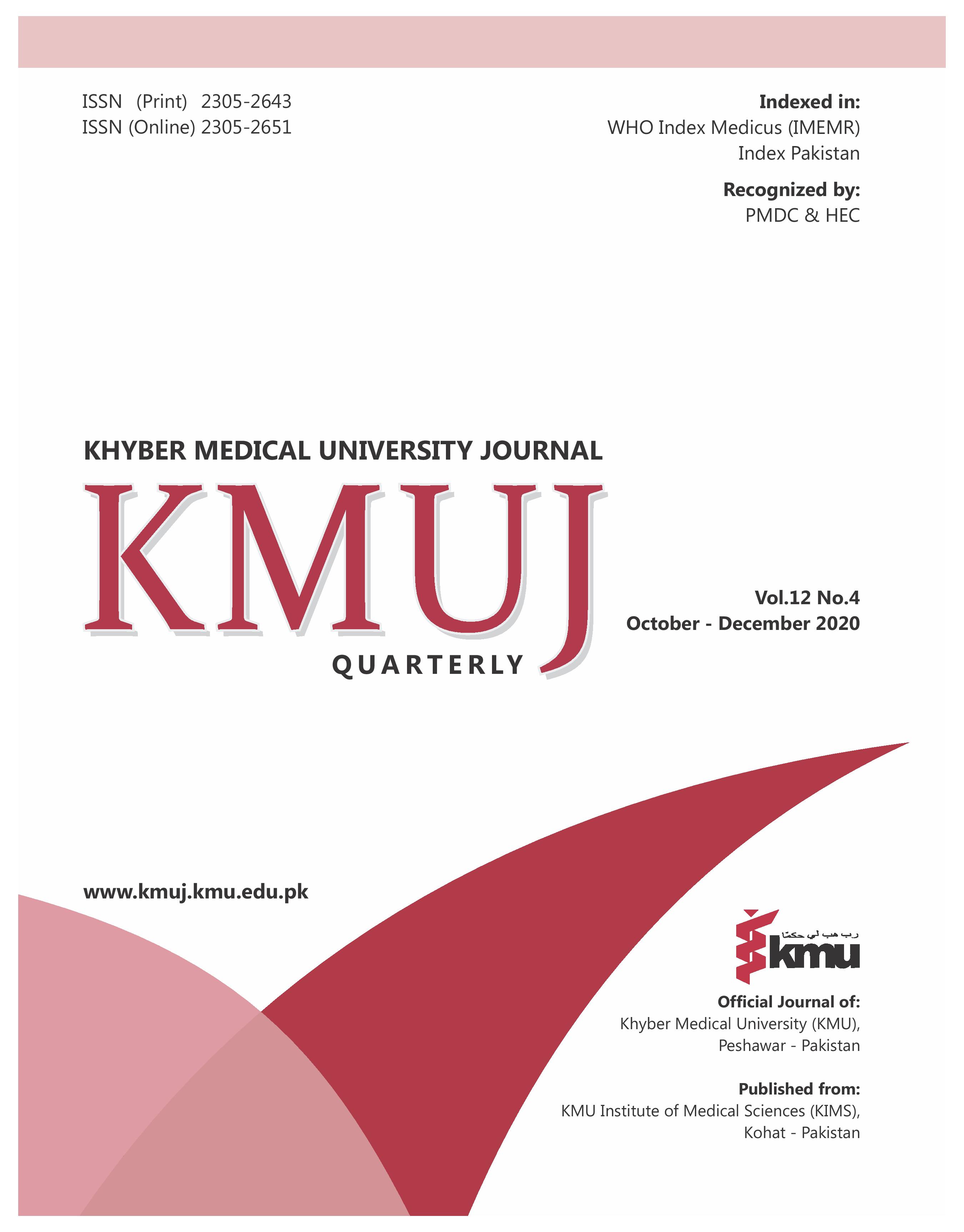EXCESSIVE DAYTIME SLEEPINESS AND ITS RELATION WITH QUALITY OF LIFE AND ACADEMIC PERFORMANCE IN MEDICAL STUDENTS
Main Article Content
Abstract
OBJECTIVES: To establish a relationship between excessive daytime sleepiness, quality of life (QOL) and academic performance among medical students.
METHODS: This descriptive cross-sectional study was conducted from August to December 2018 on 441 medical students, selected through non-probability convenience sampling from a public-sector university in Pakistan. Data collection tool was a closed ended, self-administered questionnaire, consisting of the Epworth Sleepiness Scale (ESS), WHO Quality of Life-brief version (WHOQOL- BREF) scale and demographic information. Questions regarding sleep quality before exam and self-perceived academic performance were also included. Data analysis was done using SPSS version 25. Pearson correlations and student t-tests were used at a significant level of p <0.05.
RESULTS: Out of 596 questionnaires distributed among students, 441 students returned the questionnaire with a response rate of 73.9%. The mean age of the study population was 20.56±1.61 years. The sample comprised 274 (56%) female and 194 (44%) male students. Majority of students (37.6%) had average sleep of 6-7 hours/night. Higher scores on the ESS correlated with lower scores on the WHOQOL-BREF domains and a statistically significant correlation (p<0.05) was obtained between ESS scores and WHOQOL-BREF’s physical and psychological domain scores. The study established no significant correlation between daytime sleepiness and self-reported academic performance of medical students.
CONCLUSION: Excessive daytime sleepiness is related to decreased quality of life in medical students. Thus, medical schools should provide necessary support for students to overcome such challenge in order to cope better with their continuous academic demands.
Article Details
Work published in KMUJ is licensed under a
Creative Commons Attribution 4.0 License
Authors are permitted and encouraged to post their work online (e.g., in institutional repositories or on their website) prior to and during the submission process, as it can lead to productive exchanges, as well as earlier and greater citation of published work.
(e.g., in institutional repositories or on their website) prior to and during the submission process, as it can lead to productive exchanges, as well as earlier and greater citation of published work.
References
Chellappa SL, Araújo JF. Excessive daytime sleepiness in patients with depressive disorder. Braz J Psychiatry 2006 Jun;28(2):126-9. DOI: 10.1590/s1516-44462006000200010.
Santamaria J. How to evaluate excessive daytime sleepiness in Parkinson’s disease. Neurology 2004 Oct 26;63(8 suppl 3): S21-3. DOI: 10.1212/WNL.63.8_suppl_3. S21.
D'alessandro R, Rinaldi R, Cristina E, Gamberini G, Lugaresi E. Prevalence of excessive daytime sleepiness an open epidemiological problem. Sleep 1995 Jun;18(5):389-91.
Lockley SW, Cronin JW, Evans EE, Cade BE, Lee CJ, Landrigan CP, et al. Effect of reducing interns' weekly work hours on sleep and attentional failures. N Engl J Med 2004 Oct 28;351(18):1829-37. DOI: 10.1056/NEJMoa041404.
Landrigan CP, Rothschild JM, Cronin JW, Kaushal R, Burdick E, Katz JT, et al. Effect of reducing interns' work hours on serious medical errors in intensive care units. N Engl J Med 2004 Oct 28;351(18):1838-48. DOI: 10.1056/NEJMoa041406.
Dinges DF. An overview of sleepiness and accidents. J Sleep Res 1995 Dec;4(S2):4-14. DOI: 10.1111/j.1365-2869.1995.tb00220.x..
Stutts JC, Wilkins JW, Osberg JS, Vaughn BV. Driver risk factors for sleep-related crashes. Accid Anal Prev 2003 May;35(3):321-31. DOI: 10.1016/s0001-4575(02)00007-6.
Barger LK, Cade BE, Ayas NT, Cronin JW, Rosner B, Speizer FE, et al. Extended work shifts and the risk of motor vehicle crashes among interns. N Engl J Med 2005 Jan 13;352(2):125-34. doi: 10.1056/NEJMoa041401.
Oginska H, Pokorski J. Fatigue and mood correlates of sleep length in three age‐social groups: School children, students, and employees. Chronobiol Int 2006;23(6):1317-28. DOI: 10.1080/07420520601089349.
American College Health Association. American College Health Association: National College Health Assessment II Reference Group Executive Summary, Fall 2011. Hanover, MD: American College Health Association; 2011. [Accessed on: February 20, 2014]. Available from URL: http://www.acha-ncha.org/docs/ACHA-NCHA II_ReferenceGroup_ExecutiveSummary_Fall2011.pdf.
Durmer JS, Dinges DF. Neurocognitive consequences of sleep deprivation. In Seminars in neurology 2005 Mar (Vol. 25, No. 01, pp. 117-129). Copyright© 2005 by Thieme Medical Publishers, Inc., 333 Seventh Avenue, New York, NY 10001, USA.
Hershner SD, Chervin RD. Causes and consequences of sleepiness among college students. Nat Sci Sleep 2014 Jun 23;6:73-84. DOI: 10.2147/NSS.S62907.
Programme On Mental Health WHOQOL. Div. Ment. Heal. Prev. Subst. Abus. 1998; (WHO/MNH/MHP/98.4. Rev.1).
Johns MW. A new method for measuring daytime sleepiness: the Epworth sleepiness scale. Sleep 1991 Dec;14(6):540-5. DOI: 10.1093/sleep/14.6.540.
WHOQOL Group. Development of the World Health Organization WHOQOL-BREF quality of life assessment the WHOQOL Group. Psychol Med 1998 May;28(3):551-8. DOI: 10.1017/s0033291798006667.
Sameer HM, Imran N, Tarar TN, Khawaja IS. Association of excessive daytime sleepiness with psychological distress in medical students. Prim Care Companion CNS Disord 2020 Feb 20;22(1):19m02531. DOI: 10.4088/PCC.19m02531.
Ozder A, Eker HH. The prevalence of excessive daytime sleepiness among academic physicians and its impact on quality of life and occupational performance. Int J Occup Med Environ Health 2015;28(4):721-30. DOI: 10.13075/ijomeh.1896.00367.
Szentkiralyi A, Madarasaz CZ, Novak M. Sleep disorders: Impact on daytime functioning and quality of life. Expert Rev Pharmacoecon Outcomes Res 2009 Feb;9(1):49-64. DOI: 10.1586/14737167.9.1.49.
Pagnin D, de Queiroz V. Comparison of quality of life between medical students and young general population. Educ Health (Abingdon) 2015; 28(3):209-12. DOI: 10.4103/1357-6283.178599.
ZhangY, Qu B, Lun S, Wang D, Guo Y, Liu J. Quality of life of medical students in China: A study using the WHOQOL-BREF. PLoS One 2012;7(11):e49714. DOI: 10.1371/journal.pone.0049714.
Nayak MSDP, Naidu SA, Krishnaveni A, Sreegiri S, Srinivas PJ. Quality of life in medical students of Andhra medical college, Visakhapatnam. Int J Health Sci Res 2014 Dec; 4(12): 39-43.
Aktekin M, Karaman T, Senol YY, Erdem S, Erengin H, et al. Anxiety, depression and stressful life events among medical students: A prospective study in Antalya, Turkey. Med Educ 2001 Jan;35(1):12-7. DOI: 10.1046/j.1365-2923.2001.00726.x.
El Hangouche AJ, Jniene A, Aboudar S, Errguig L, Rkain H, Cherti M, et al. Relationship between poor quality sleep, excessive daytime sleepiness and low academic performance in medical students. Adv Med Educ Pract 2018 Sep 7;9:631-638. DOI: 10.2147/AMEP.S162350.
